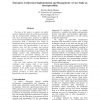Free Online Productivity Tools
i2Speak
i2Symbol
i2OCR
iTex2Img
iWeb2Print
iWeb2Shot
i2Type
iPdf2Split
iPdf2Merge
i2Bopomofo
i2Arabic
i2Style
i2Image
i2PDF
iLatex2Rtf
Sci2ools
102
click to vote
HICSS
2006
IEEE
2006
IEEE
Enterprise Architecture Implementation and Management: A Case Study on Interoperability
The focus of this study is to explore why public agencies implement enterprise architecture programs and the interoperability challenges they are faced with when governing these programs at different levels (vertical) and different functions (horizontal) of government. With a theoretical lens based on institutional theory from the political science field, the analysis shows that interoperability is not just a technical issue and that economic and political factors are just as important when implementing enterprise architecture programs in government. The findings suggest that implementing enterprise architectures in government challenge the way information systems are organized and governed in public agencies and calls for a broader definition of interoperability. The case study indicates that interoperability challenges arise because there is no overall coordination of different information systems initiatives in the health sector and because public hospitals have no economic and/or ...
Biometrics | Enterprise Architecture Programs | HICSS 2006 | Interoperability Challenges | Public Agencies | System Sciences |
Related Content
| Added | 11 Jun 2010 |
| Updated | 11 Jun 2010 |
| Type | Conference |
| Year | 2006 |
| Where | HICSS |
| Authors | Kristian Hjort-Madsen |
Comments (0)

